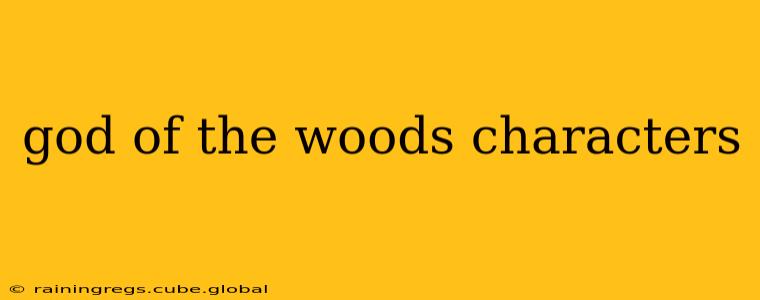The concept of a "god of the woods" varies dramatically across cultures and mythologies. There isn't one single, universally recognized deity holding this title. Instead, numerous gods and goddesses, spirits, and other supernatural beings embody aspects of the forest, wielding power over its creatures and vegetation. This exploration delves into some of the most prominent examples, examining their roles, attributes, and the rich tapestry of stories surrounding them.
Who are some of the most famous Gods of the Woods?
This question often sparks debate, as the specific title "God of the Woods" isn't always explicitly used. Many deities preside over aspects of nature that include forests. Some of the most recognizable include:
-
Pan (Greek Mythology): Perhaps the closest equivalent to a singular "god of the woods," Pan is the rustic, horned god associated with shepherds, flocks, and the wild, untamed aspects of nature. He's known for his unpredictable nature and his ability to inspire both fear and fascination. His domain extends to the wilderness, and he's deeply connected to the nymphs and satyrs that inhabit the forests.
-
Silvanus (Roman Mythology): The Roman counterpart to Pan, Silvanus is a god of forests, fields, and agriculture. He's often depicted with a staff and accompanied by rustic symbols of the countryside. Unlike Pan's more capricious nature, Silvanus is often portrayed as a protector of the land and its fertility.
-
Cernunnos (Celtic Mythology): This horned god is a prominent figure in Celtic mythology, often depicted seated and holding a torc (necklace) and sometimes a stag's antlers. He's associated with the wilderness, animals, and the underworld, representing both the life-giving and death-dealing aspects of nature. His connection to forests is prominent, reflecting the cycle of growth and decay.
-
Green Man (European Folklore): Not strictly a deity, the Green Man is a symbolic figure representing rebirth and the cycle of nature. His image, often carved in stone or wood, depicts a face emerging from foliage, symbolizing the resurgence of life in spring. He embodies the spirit of the forest itself, rather than being a separate controlling entity.
What are the powers and attributes of these forest deities?
The powers and attributes of forest deities vary considerably depending on their origin and cultural context. However, common threads include:
-
Control over flora and fauna: Many forest deities have dominion over the plants and animals inhabiting their woods. They can influence the growth of trees, the abundance of harvests, and the behavior of wild creatures.
-
Guardianship of the forest: They are often portrayed as protectors of the woodlands, ensuring balance and preventing harm. This protection can extend to those who respect the forest and its inhabitants.
-
Shapeshifting abilities: Some forest deities, like Pan, are known for their ability to transform their appearance, blending seamlessly with the natural environment.
-
Magical abilities: Many are associated with magic, particularly concerning healing, fertility, and divination. Their connection to the natural world grants them access to potent forces.
What are the differences between gods of the woods from different cultures?
The significant differences lie in cultural interpretations of nature and the human relationship with it. For example:
-
Greek and Roman gods tend to have more defined personalities and roles within a structured pantheon. They often interact with humans directly, sometimes interfering in their affairs.
-
Celtic deities, like Cernunnos, are often more mysterious and less anthropomorphic, representing potent natural forces rather than individual personalities.
-
Folkloric figures, such as the Green Man, represent archetypal ideas and symbols with less emphasis on individual stories or actions.
Are there any other deities or spirits associated with woods?
Yes, countless lesser deities, spirits, and mythological creatures inhabit forests in various cultures. Nymphs (Greek), dryads (Greek), and tree spirits (various cultures) are examples of nature spirits intricately connected to specific trees or woodlands. They often lack the power and prominence of major deities but play vital roles within the forest's ecosystem and mythology.
This exploration only scratches the surface of the vast array of "gods of the woods" found in human cultures. Their stories reflect humanity’s profound connection to the natural world and our enduring fascination with the mysteries and power of the forest.
